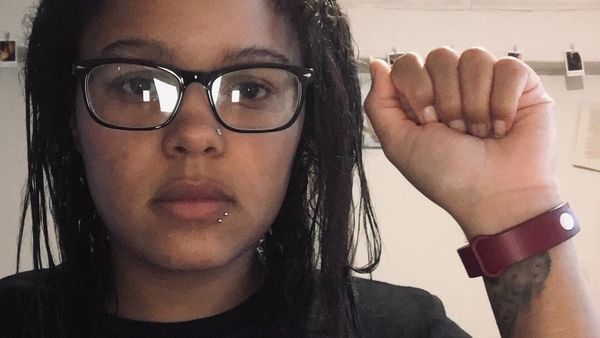Ava DuVernay's 2016 documentary, 13TH, centers around the history and current state of racism in the United States' criminal justice system. Viewers may be familiar with DuVernay's previous work in 2014, Selma.
I had the pleasure to view Selma at the United Nations followed by a discussion with DuVernay (we took the framed movie poster advertised on stage with us, too). Based on hearing from DuVernay and watching Selma, it was easy to tell that her perspective lens is mostly on telling the story from the oppressed's point of view like in Selma where critics noted Johnson was portrayed as hesitant to pass the Civil Rights Act, but it was mostly because of congressional obstruction not shown in the movie that caused the delay. Selma was deserving of every award nomination as a drama, but from a historical perspective, it was hard to call DuVernay a reliable narrator.
In 13TH, DuVernay, clearly now a reputable film maker focused on exposing civil injustice, concentrates more on the truth rather than Hollywood distortions like in Selma. Through narration by politicians and activists, 13TH tells that racial injustice is not over in today's time. DuVernay proves that since the ratification of the 13th Amendment, government has found ways to minimize social mobility for blacks and other minorities. Before the 13th Amendment, people of color were enslaved, viewed as property, had no rights, and counted as 3/5 of a person. After, they were no longer property and counted as a full human being with the right to own land and work for pay. However, Jim Crow laws were passed during Reconstruction to hinder growth for freedmen. After the Civil Rights Movement, Jim Crows were gone and the era of mass incarceration started.
The difficulty of understanding the racism in criminal justice is that it implies an inherit racism. Instead of explicitly declaring a war on blacks and minorities, the war was declared on excess crime and drugs in neighborhoods that happened to have a large minority population. The imprisoned population went from about 350,000 in 1970 to about 2.3 million in 2014 which makes up about 25 percent of the world's prison population (the United States itself only makes up 5 percent of the world's total population). 13TH shows that 6.5 percent of the Americans are black, but they make up 40.2 percent of the prison population because it is in their neighborhoods where crime and poverty rates are higher than anywhere else, but today's criminal justice system fails to help those families get out of crime and break the poverty cycle.
Where the documentary gets shaky is who is to blame. Some parts suggests cops for their police brutality. While many police officers over the past century expressed unnecessarily brutal behaviors towards unarmed minorities putting the blame solely on the police is like blaming the Vietnam War on the soldiers who fought it. Cops, like troops, are doing the jobs the government told them to do. While some go extreme, the cause lies in the scenes where politicians are championing harsher penalties for crimes.
Many presidents like Nixon, Reagan, H.W. Bush, Clinton, and Trump campaigned on the principle of restoring law and order. Nixon introduced it first to appeal to create the southern strategy to promote states' rights. Reagan was the first to enforce it to start the war on drugs. H.W. Bush used the rhetoric to beat Michael Dukakis, and Clinton introduced the Three Strikes Bill and minimum sentences to boost prison population. Trump... well who knows what Trump is going to do to restore law and order but it probably won't be expanding government programs to help families break the cycle of poverty or providing rehab treatment to drug abusers.
While 13TH justifies that the Black Lives Matter movement tries to prove black lives matter just as much as all other lives, it remains questionable if they are fighting the right fight against the right people in the right way. Physically fighting back officers and setting cities into a blaze is probably not going to help reduce the incarceration population. The real fight is against politicians backed by lawmaking coalitions like ALEC or the CCA who want to privatize prisons so businessmen can profit off the convicted, people who believe that equal rights have been achieved and the game is over, and those afraid of living in a progressive society where people are tender, not tough, on those who may not look like them, or believe in the same faith.
Once more people, especially in Washington, can understand that a society is stronger when people are together, then real change can be made to the problems 13TH explains. Instead of throwing more young men and women in a cell for possession of an illegal drug, eventually the justice system should transition those people into rehab, career counseling, or educational enhancement. DuVernay's work on this documentary is exceptional and should be viewed in schools and colleges all over.





















